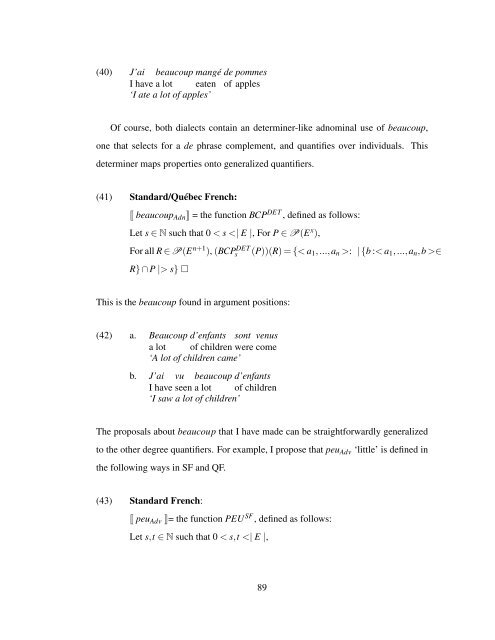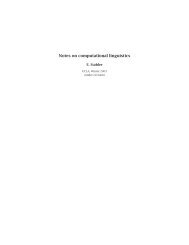Formal Approaches to Semantic Microvariation: Adverbial ...
Formal Approaches to Semantic Microvariation: Adverbial ...
Formal Approaches to Semantic Microvariation: Adverbial ...
You also want an ePaper? Increase the reach of your titles
YUMPU automatically turns print PDFs into web optimized ePapers that Google loves.
(40) J’ai beaucoup mangé de pommes<br />
I have a lot eaten of apples<br />
‘I ate a lot of apples’<br />
Of course, both dialects contain an determiner-like adnominal use of beaucoup,<br />
one that selects for a de phrase complement, and quantifies over individuals. This<br />
determiner maps properties on<strong>to</strong> generalized quantifiers.<br />
(41) Standard/Québec French:<br />
beaucoup Adn = the function BCP DET , defined as follows:<br />
Let s ∈ N such that 0 < s : | {b :< a 1 ,...,a n ,b >∈<br />
R} ∩ P |> s} □<br />
This is the beaucoup found in argument positions:<br />
(42) a. Beaucoup d’enfants sont venus<br />
a lot of children were come<br />
‘A lot of children came’<br />
b. J’ai vu beaucoup d’enfants<br />
I have seen a lot of children<br />
‘I saw a lot of children’<br />
The proposals about beaucoup that I have made can be straightforwardly generalized<br />
<strong>to</strong> the other degree quantifiers. For example, I propose that peu Adv ‘little’ is defined in<br />
the following ways in SF and QF.<br />
(43) Standard French:<br />
peu Adv = the function PEU SF , defined as follows:<br />
Let s,t ∈ N such that 0 < s,t
















